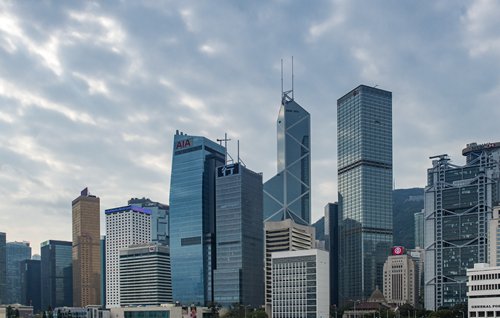HOME >> BUSINESS
Dented investor confidence, business unease show that impact of HK unrest starts to pile up
Source:Global Times Published: 2019/8/21 21:13:40
Canceled IPOs point to dented investor confidence

A view of Hong Kong in February 2018 Photo: IC
After weeks of violent unrest in Hong Kong, warning signs of a potentially devastating economic impact on the global financial hub have started to pile up, as several recent major deals underscored unease among businesses in the city and beyond.
On Monday, Hong Kong-based real estate developer CK Asset Holdings, which is controlled by the family of the city's richest man Li Ka-shing, announced that it had agreed to acquire Greene King, a pub chain and brewer in the UK, for 4.6 billion pounds ($5.6 billion). CK Asset will also take over Greene King's debts.
Though the company stressed that the deal was based on considerations for the UK company's attractive land assets and ability to generate cash, the move immediately revived lingering speculation about the Li family shifting its businesses from the Chinese mainland and Hong Kong to overseas.
Liang Haiming, an economist at Hainan University, said that CK Asset made the deal most likely due to the cheaper price of the target as the pound depreciated sharply due to its Brexit chaos. Since the Brexit referendum in 2016, the UK currency has depreciated about 18 percent against the Hong Kong dollar.
"Li has indeed withdrawn a large amount of money from the mainland and Hong Kong to invest in Europe and the US, particularly the UK," Liang said. According to some estimates, Li has unloaded assets in the mainland and Hong Kong worth nearly 200 billion yuan ($28.33 billion) over the past few years, while investing more than HK$400 billion ($51 billion) in the UK alone.
Li has denied rumors of withdrawal from the mainland and Hong Kong and said in 2018 that he loves China and he loves Hong Kong. Last week, Li broke his silence since the protests started in June and bought newspaper ads that called for an end to violence in Hong Kong. CK Asset also joined other developers in the city to voice their opposition to violence.
"Persistent chaos is no doubt hurting Hong Kong's economy and reputation," Liang said, "but the mainland has a huge market, China's economic development will not be stopped by any individual leaving or coming, as long as the public still have confidence in the mainland economy."
Adding to the signs of unease was a reported decision by Chinese e-commerce giant Alibaba Group to postpone its listing in the Hong Kong Stock Exchange, which had been planned for August. Alibaba's delay of its up to $15 billion IPO was due to the "lack of financial and political stability in Hong Kong," Reuters reported on Wednesday, citing people familiar with the situation.
Alibaba declined to comment on the report on Wednesday.
In July, global brewer Anheuser-Busch InBev canceled a plan to list its Asia-Pacific unit in Hong Kong that planned to raise up to $9.8 billion.
In a blog post on Sunday, Hong Kong Financial Secretary Paul Chan Mo-po warned that the Hong Kong economy might face a recession in the third quarter and an "economic typhoon" is imminent, calling on all parties to drop their differences and work together to minimize the impact.
Newspaper headline: Unrest starts to weigh on HK
Posted in: COMPANIES